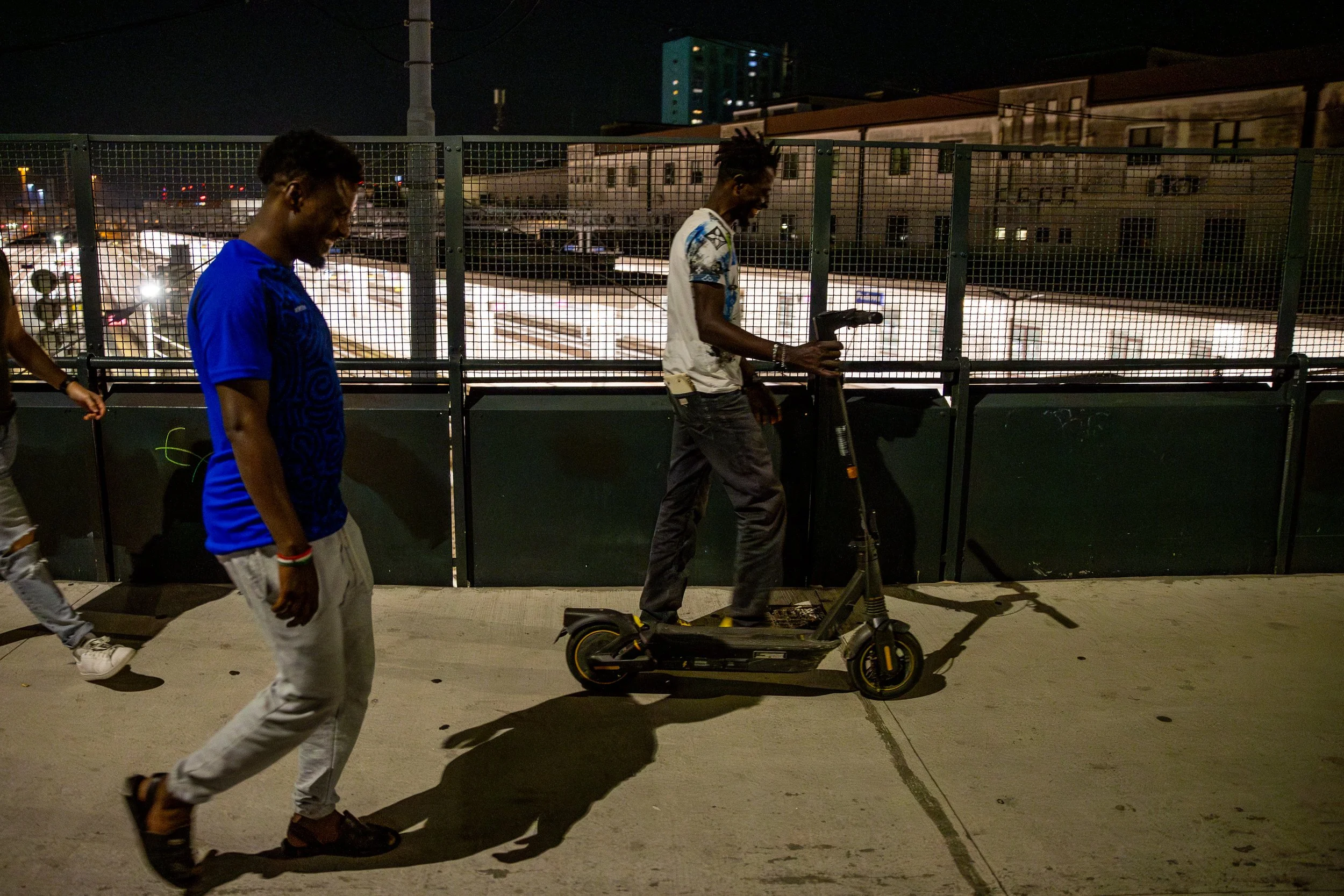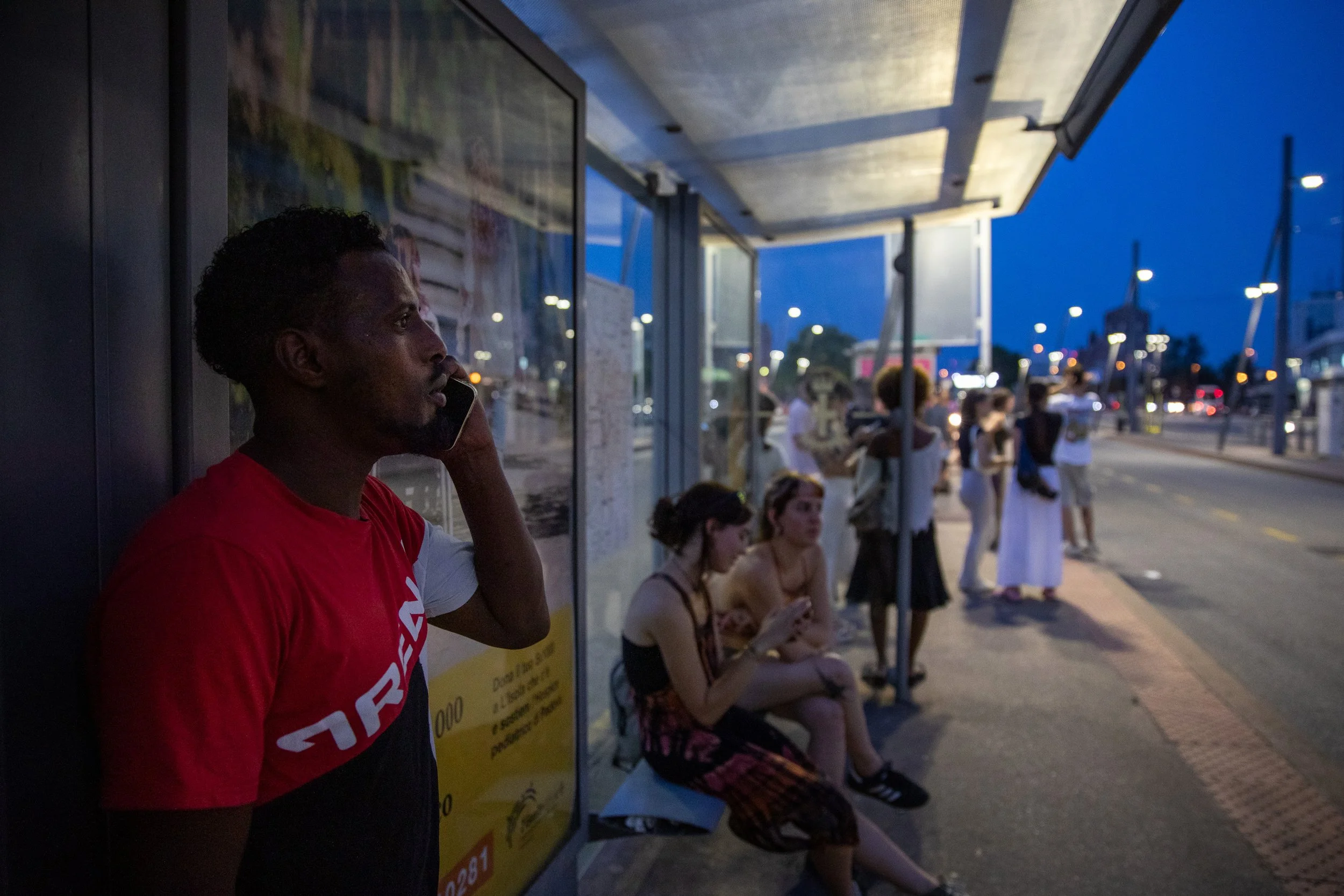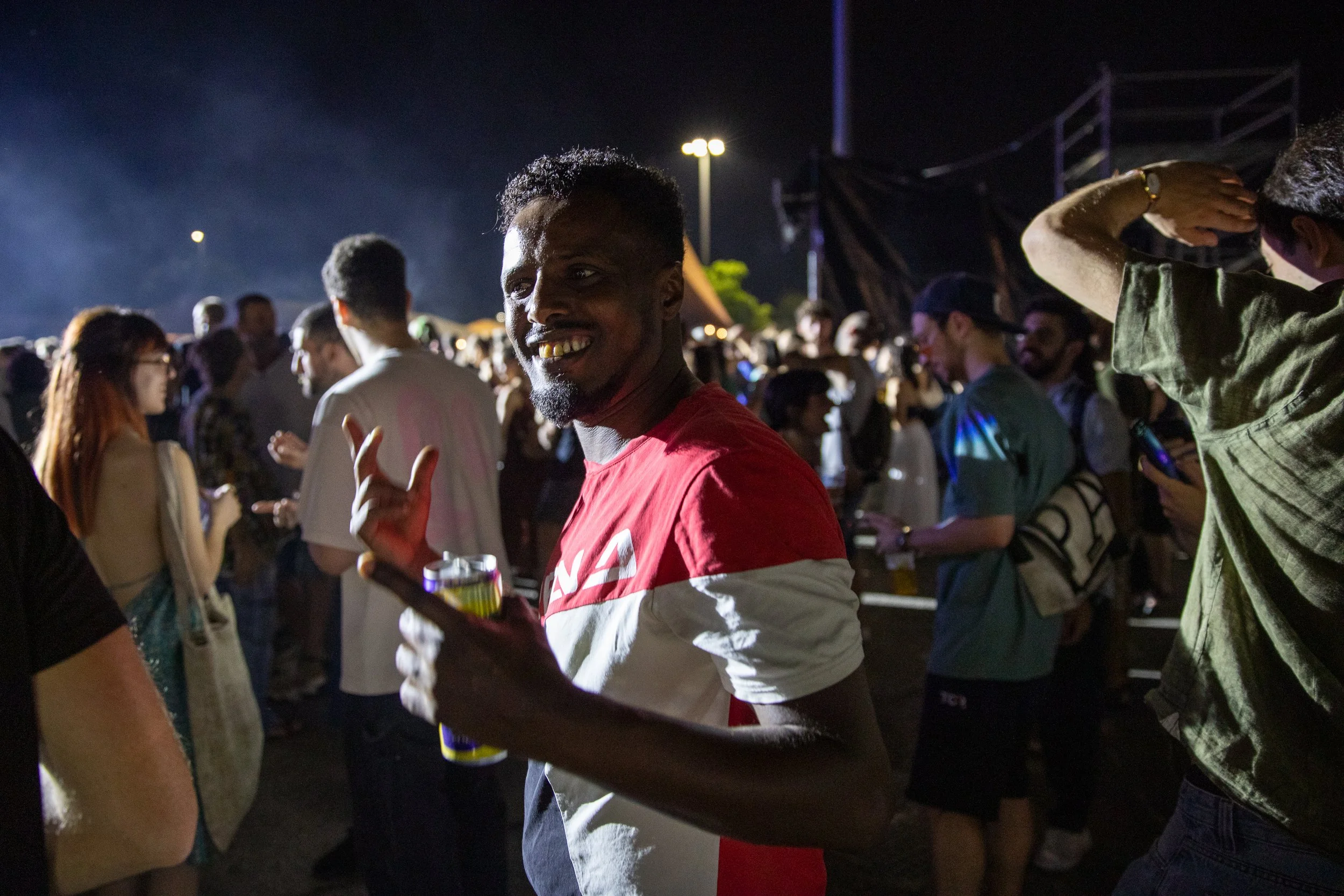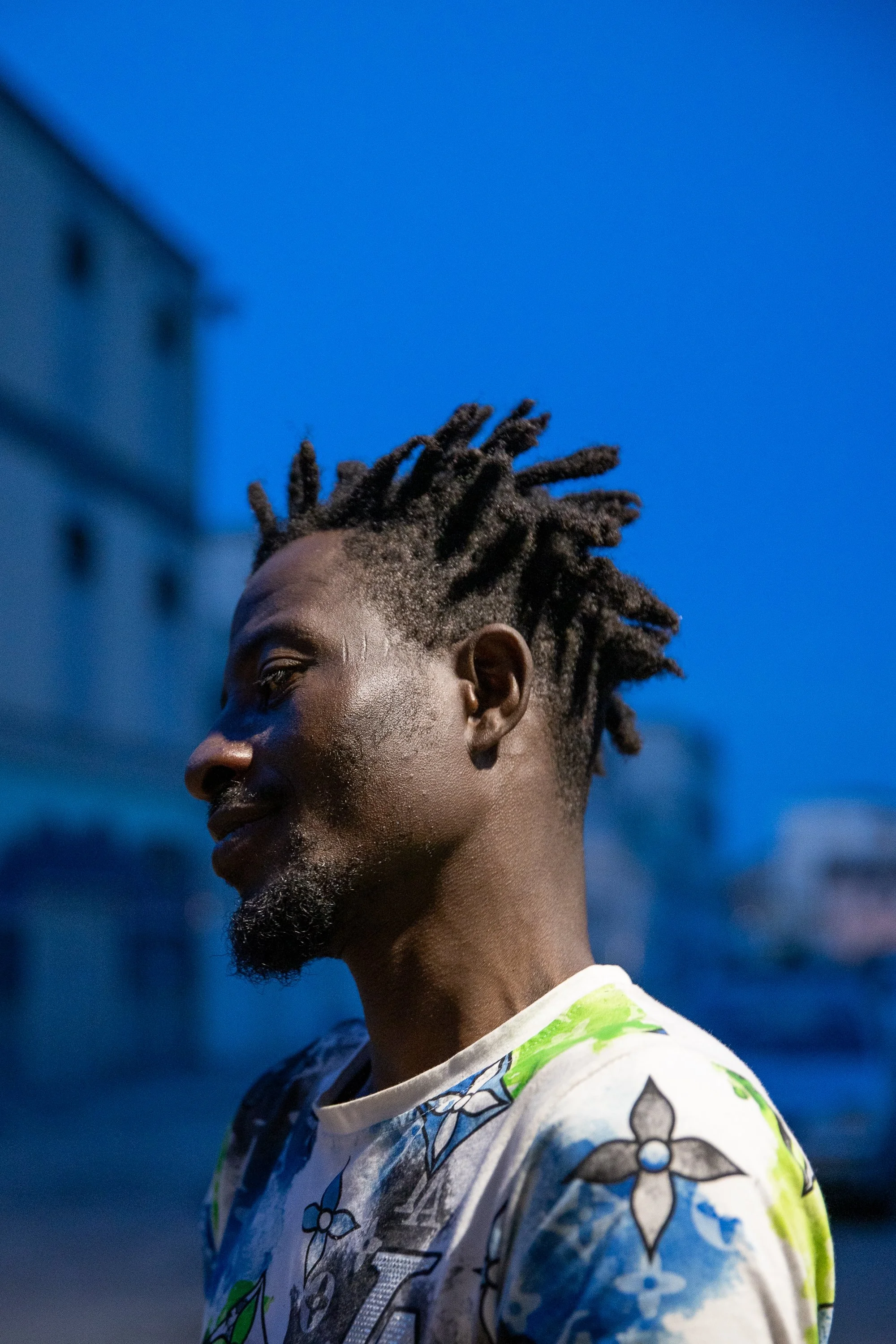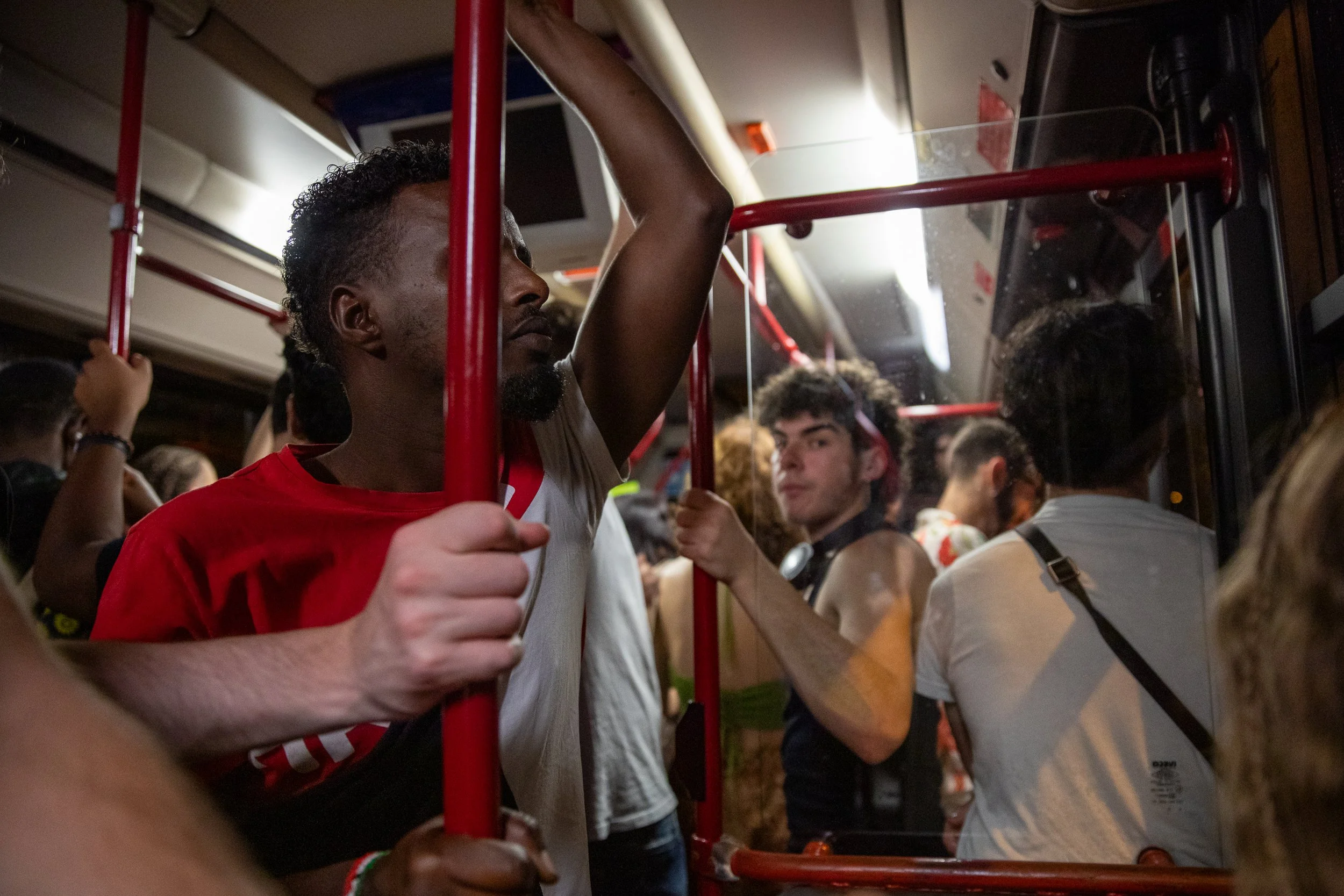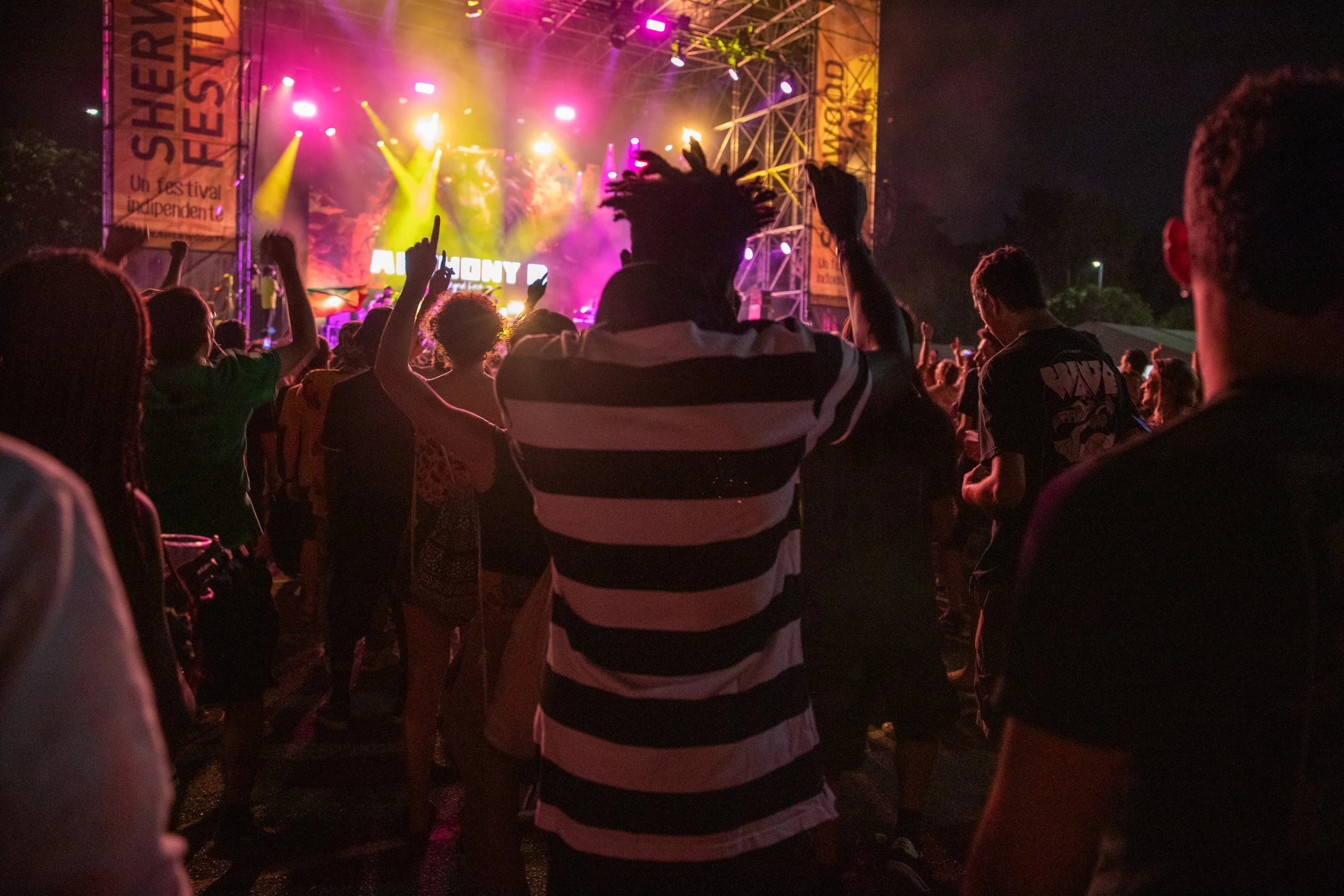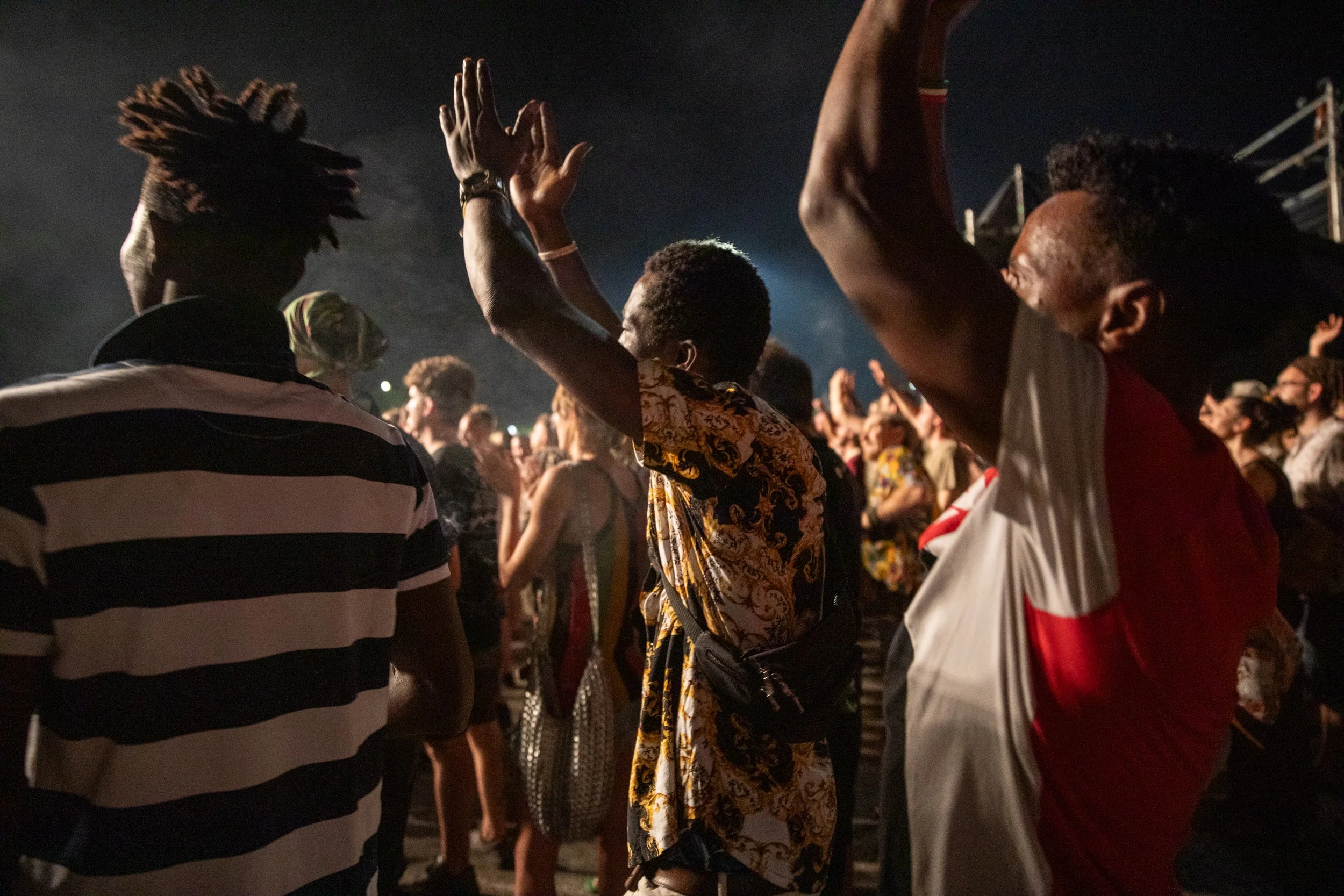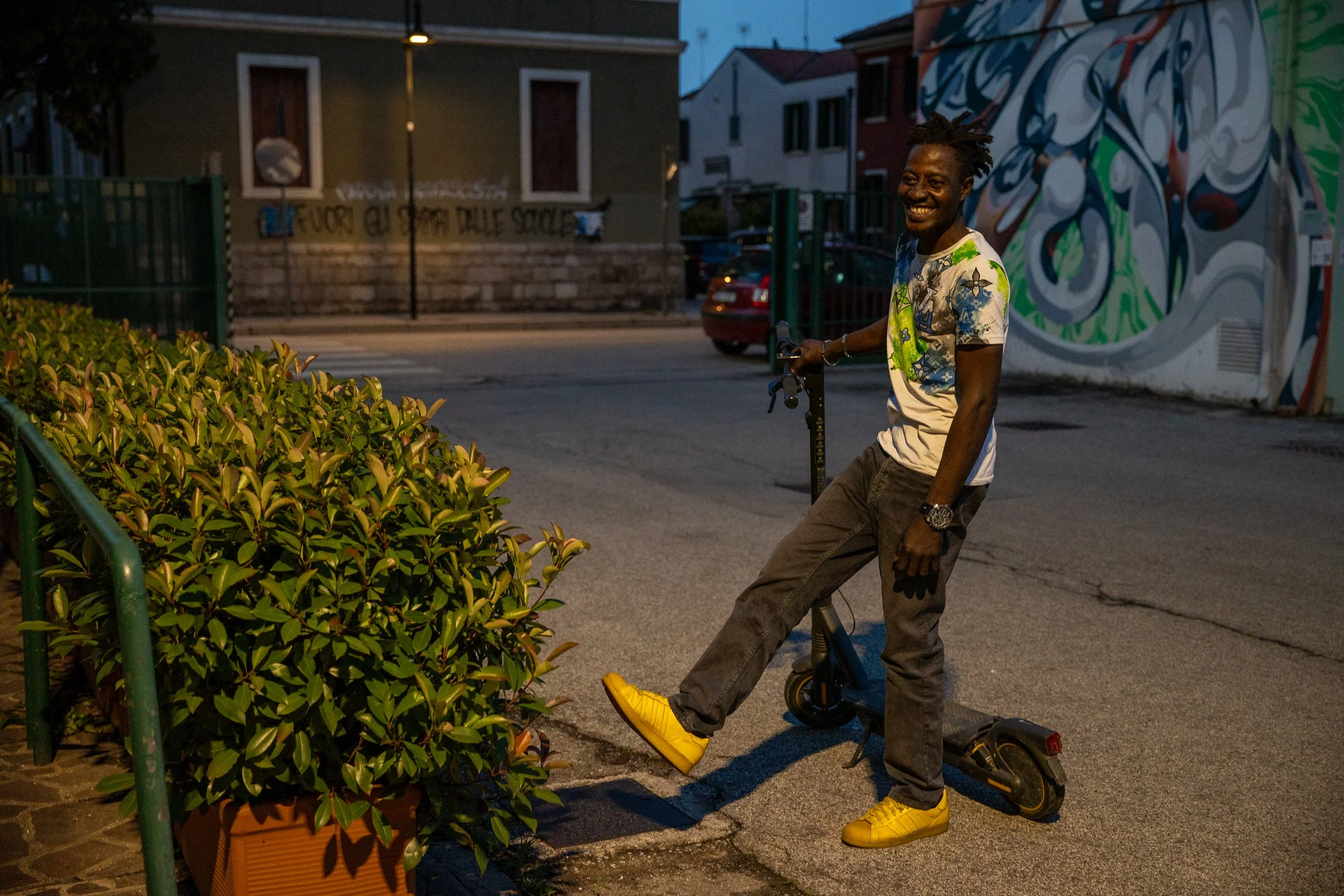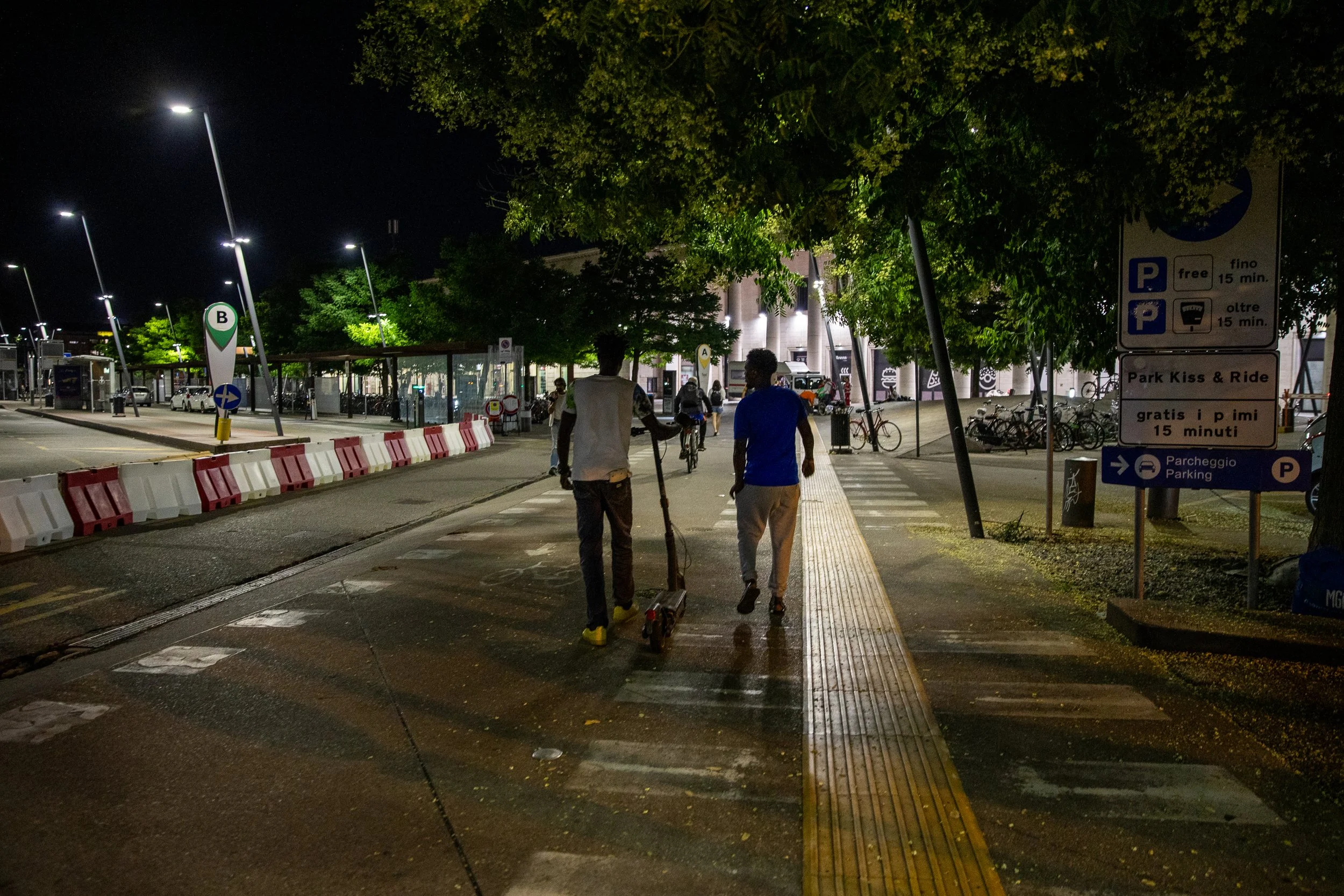Across the Bridge — Padova, Italy
Writing by Andrew Botolino
Ahmed (left), 28 from Somalia, and Abdul, 37 from Ghana, walk across the bridge that marks the racial and socio-economic divide in Padova, Italy on June 26, 2024.
On the third day, a man sneaked Ahmed a date.
Ahmed, his last name withheld for security reasons, had left his home in Somalia several months earlier. His route to Italy passed through Bani Walid, a Libyan town 100 miles from Tripoli. There, a paramilitary clan group awaited. The clan captured, enslaved, and extorted him — common to many Africans who flee war, violence, or economic desolation in an attempt to reach Europe. When one of the guards abused a female fellow captive, Ahmed tried to intervene.
The clan retaliated, shackling his arms and legs and holding him outside for three days, without food, without water. One guard pressed a rifle to his head while another punched and kicked him. He could not move for a week thereafter.
Ahmed spent a year on tahrib — the hazardous journey from Somalia to Europe — then two and a half years in Italy, then four and a half years in Germany, then several months in Italy again, living in a Padova apartment for refugees run by the nonprofit migrant support organization Popoli Insieme — People Together. Here, Ahmed, 28, leaned back in his chair. “The person who gives you one date,” he said, “you will remember forever.”
Ahmed, 28 and a refugee from Somalia, talks to his wife on the phone as he waits for the bus in Padova, Italy — where he seeks asylum — on June 28, 2024. Ahmed is waiting for documentation to see his wife and son, who he has never met, in Sweden.
Ahmed, 28 from Somalia, enjoys the Sherwood Festival in the Province of Padova, Italy on June 28, 2024.
He slipped his soccer boots on, grabbed two dates from a plastic container, and smiled. “Ready?”
His route was almost linear. He jogged south, toward the train station, across the bridge, to where kebab shops turned into gelaterias and ivy coiled around the coppi-roofed homes lining the Bacchiglione river.
He passed students who smoked cigarettes between classes at the famous University of Padova, where Galileo lectured hundreds of years ago, dodged tourists who drank mint coffee and puttered around the famous Caffè Pedrocchi, and watched hordes of people congregate around the famous Basilica of St. Anthony, which housed the chin and tongue of the patron saint of the poor, of sailors and fishermen, of priests and travelers.
He paused at the Prato della Valle. In the city center’s famous square, Ahmed cupped his hands under the speckled spigot of a fountain, letting the cool water fill them before splashing his face.
He turned and jogged north — back home — toward the train station, across the bridge. He passed the entrance of a Bangladeshi pizzeria, where nights later, against the sound of throttled moped engines, a sinewy man in a cerulean tank top would launch a flying front snap kick into the nose of a man in a sweat-stained grey t-shirt.
Ahmed wanted to study education and become a teacher, but could not enroll. He did not have the proper legal status. He had a wife in Sweden, who he could not see, and a son, whom he had never seen, because immigration laws forced Ahmed to remain in Italy.
Days before, Ahmed sat across from Abdul, 37, a Ghanaian with a weathered gaze and a historian’s passion for American civics. The two men lived in the concrete apartment together, with eighteen other men from Ghana, Gambia, Somalia, Mali, and Burkina Faso.
The bedroom of the apartment where Ahmed, 28 from Somalia, and Abdul, 37 from Ghana, lived with 18 other men seeking asylum in Padova, Italy on June 26, 2024.
Abdul, 37 and a refugee from Ghana, waits outside the Popoli Insieme apartment where he lives with 18 other men seeking asylum in Padova, Italy on June 26, 2024. He spent seven years unhoused in Padova before connecting with the non-profit who helped him find housing.
Ahmed, 28 and a refugee from Somalia, takes a bus to a the Sherwood Festival outside of Padova, Italy — where he seeks asylum — on June 28, 2024. Ahmed is waiting for documentation to see his wife and son, who he has never met, in Sweden.
Abdul (left), 37 from Ghana, and one of his housemates make dinner in the kitchen of the Popoli Insieme apartment where he lives with 18 other men seeking asylum in Padova, Italy on June 26, 2024. Abdul spent seven years unhoused in Padova before connecting with the non-profit who helped him obtain housing.
Abdul, his last name withheld for security reasons, stared into his empty palm, holding it inches away from his lips. He slowly fulcrummed his forearm until the space between his hand and mouth measured the length of the cigar in his mind’s eye. “Long,” he said.
“The big ones!” Ahmed said, chiming in.
They laughed, Ahmed tilting his head back, Abdul thrusting all of his weight on the back legs of his chair, rocking it to its tipping point.
“If you see someone wearing a coat, smoking,” Abdul said, “you say, ohhh, big man!”
“Rich man!” Ahmed said.
“But when you see me, smoking, you say, ohhh, this foolish peasant!” Abdul said.
Abdul, 37 from Ghana, dances at the Sherwood Festival as Jamaican DJ Anthony B performs in the Province of Padova, Italy on June 28, 2024.
Abdul (left), 37 from Ghana, Ahmed (right), 28 from Somalia, and their friend cheer on the motivational messages from Jamaican DJ Anthony B at the Sherwood Festival in the Province of Padova, Italy on June 28, 2024.
“Yes! Yeah, yes.” Ahmed said, laughing in agreement, and in turn, Abdul’s own baritone laugh rolled out as an exclamation mark, pinballing off the walls and filling the hall for a few seconds before the metaphor swept it quiet, and still.
“If you ask somebody directions to go somewhere, a white person, she will not tell you,” Abdul said. “Non lo so, non vivo qua.” I don’t know, I don’t live here.
“In Padova,” Ahmed said, in confirmation.
“In the whole of Italy!” Abdul said.
Abdul, 37 and a refugee from Ghana, laughs as he waits outside the Popoli Insieme apartment where he lives with 18 other men seeking asylum in Padova, Italy on June 26, 2024. He spent seven years unhoused in Padova before connecting with the non-profit who helped him find housing.
Ahmed (left), 28 from Somalia, and Abdul, 37 from Ghana, wait for the bus to leave the Sherwood Festival in the Province of Padova, Italy on June 28, 2024.
Abdul wanted to study political science, but could not enroll. He did not have the proper legal status. He lived in an abandoned house north of the bridge for several years until the military police in Padova beat him, leaving him with a chest contusion. When asked if he would rent an apartment in the city once he left the refugee house, he laughed.
“If you and Bangladesh go and check out work, they will take the Bangladeshi and leave you, the Black,” Abdul said, motioning to Ahmed. “If me and Tunisia, we are going to a company, they will take the Tunisian. Because you are Black. Because I’m Black.”
Hours later, as I walked back south, toward the train station, across the bridge, a couple approached me, and asked for directions. I did not know. I did not live there.
Abdul (left), 37 from Ghana, and Ahmed, 28 from Somalia, walk back home toward the bridge that marks the racial and socio-economic divide in Padova, Italy on June 26, 2024.
